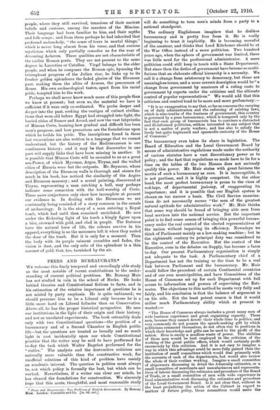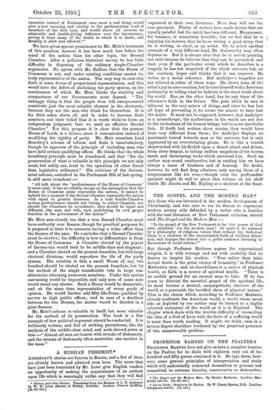PEERS AND BUREAUCRATS.* WE welcome this finely tempered and exceedingly
able study as the most notable of recent contributions to the under- standing of current political problems. Mr. Ramsay Muir has not studied in vain in the school of Burke. He looks behind theories and Constitutional fictions to facts, and in his estimation of the relative importance of questions be is not misled by party emphasis. He is quite unbiassed; we should presume him to be a Liberal only because he is a little more bard on Liberal fallacies than on Conservative. Above all, he has the proper historical perspective. He sees our institutions in the light of their origin and their history, and not as unrelated experiments. The book ostensibly deals only with two Constitutional questions—the position of a bureaucracy and of a Second Chamber in English public life—but the questions are treated so broadly and so much light is cast incidentally upon our whole Constitutional practice that the writer may be said to have performed for to-day the task which Walter Bagehot performed for the "sixties." The analysis and the destructive criticism are naturally more valuable than the constructive work, for unofficial solutions of this kind of problem have mainly an academic interest. The question in politics must always be, not which policy is formally the best, but which can be worked. Nevertheless, if a writer can clear our minds, he has cleared the foundations for construction. We sincerely hope that this acute, thoughtful, and most reasonable study
• Peers and Bureaucrats: Two Problems of English Government. By Ramsay
Muir, London: Constable and Co. [4s. C4 net.j will do something to turn men's minds from a party to a national standpoint.
The ordinary Englishman imagines that he dislikes bureaucracy and is pretty free from it. He is really beginning to trust it implicitly. He is becoming scornful of the amateur, and thinks that Lord Kitchener should be at the War Office instead of a mere politician. Two hundred years ago, when the sphere of government was limited, there was little need for the professional administrator. A mere politician could still keep in touch with a State Department. But since then the duties of government have become so multi- farious that an elaborate official hierarchy is a necessity. We call it a change from aristocracy to democracy, but these are meaningless terms, and a more correct description would be " a change from government by amateurs of a ruling caste to
government by experts under the criticism and the ultimate control of popular representatives." We would add that this criticism and control tend to be more and more perfunctory:— "It is no exaggeration to say that, so far as concerns the carrying on of daily administration and the enforcing of existing laws, which is nine-tenths of the business of government, this country is governed by a pure bureaucracy, which is tempered only by the fact that each group of bureaucrats has to convince a distracted and ill-informed politician, seldom interested in any subject that is not a matter of party warfare; and has also to satisfy the lively but quite haphazard and spasmodic curiosity of the House of Commons."
The bureaucracy even takes its share in legislation. The Board of Education and the Local Government Board by means of administrative regulations made under the authority of various statutes have a vast discretionary power as to policy; and the fact that regulations so made have to lie for a time on the tables of the two Houses does not seriously qualify this power. Mr. Muir states with great fairness the merits of such a bureaucracy as ours. It is incorruptible, it is not partisan, and it is highly competent. On the other hand, the most perfect bureaucracy is prone to the vices of red-tape, of departmental jealousy, of exaggerating its importance; and it is possible that our English system is chosen on too narrow a basis. The Civil Service examina- tions do not necessarily secure "the men of the greatest natural aptitude for administrative work." Mr. Muir thinks that some way should be found of bringing able men from local services into the national service. But the important point is to find some means of bringing this powerful bureau- cracy under the real control of the elected representatives of the nation without impairing its efficiency. Nowadays we think of Parliament mainly as a law-making machine ; but in the eighteenth century its principal duty was eonaidered to be the control of the Executive. But the control of the Executive, even in the debates on Supply, has become a farce to-day. Our present Parliamentary organisation is simply not adequate to the task. A Parliamentary chief of a Department has not the training or the time to be a real link between Parliament and the bureaucracy. Mr. Muir would follow the precedent of certain Continental countries and of our own municipalities, and have Committees of the House of Commons set up for each Department with full access to information and powers of supervising the Esti- mates. The objections to this method he meets very fully and fairly, and his conclusion is that the balance of argument is on his side. Not the least potent reason is that it would utilise much Parliamentary ability which at present is wasted :—
" The House of Commons always includes a great many men of wide business experience and great organising capacity. These men, because they cannot devote their whole time to politics, and very commonly do not possess the speech-making gift by which politicians commend themselves, do not often rise to positions in which their knowledge and gifts can be used to the profit of the nation. Here is surely a needless waste of power. The abilities of these men would be best employed in the criticism of the working of the great public offices, which would certainly profit enormously by this criticism. And it is not easy to imagine a way in which this advantage could be more fully gained than the institution of small committees which would deal primarily with the accounts of each of the departments, but would also review the whole of their routine working. Imagine a small committee of shipowners disoussing in detail the Admiralty estimate's, or a small committee of merchants and manufacturers and representa- tives of labour discussing the estimates and procedure of the Board of Trade, or a small committee of men with wide experience in local administrative work discussing the estimates and procedure of the Local Government Board. Is it not clear that, without in the least prejudicing the action of the Cabinet in regard to matters of future policy, these committees would make the
executive control of Parliament once more a real thing, would give a new meaning and vitality to the parliamentary work of members of the best type, and would above all exercise an admirable and health-giving influence over the bureaucracy, saving it from many of the faults to which it is liable, and keeping it alert and efficient ?"
We have given special prominence to Mr. Muir's treatment of this question because it has been much less before the
mind of the nation than his other topic, the Second Chamber. After a judicious historical survey, he has little difficulty in disposing of the ordinary single-Chamber arguments. He agrees with Mr. Balfour that the House of Commons is not, and under existing conditions cannot be, truly representative of the nation. The only way to cure this fault is some device of proportional representation, and this would have the defect of abolishing the party system, on the continuance of which Mr. Muir thinks the stability and compactness of our Governments must depend.. " The unhappy thing is that the people thus left unrepresented constitute just the most valuable element in the electorate, because they are the men who think for themselves. It is for their sakes above all, and in order to increase their numbers, and their belief that it is worth while to form an independent judgment, that we need an effective Second Chamber." For this purpose it is clear that the present House of Lords is a failure, since it concentrates instead of modifying the rigidity of party. Mr. Muir examines Lord Rosebery's scheme of reform and finds it unsatisfactory, though he approves of the principle of including men who have held certain qualifying offices. He thinks that the whole hereditary principle must be abandoned, and that " for the preservation of what is valuable in this principle we not only must, but safely can, trust to the operation of other forces than legislative ordinance." His criticism of the Govern- ment seheme, embodied in the Parliament Bill of last spring,
is still more trenchant :—
" All talk about the 'predominance of the House of Commons' is mere cant; it has no validity except on the assumption that the House of Commons alone represents the nation; it cannot be upheld for a moment if the Second Chamber represents the nation with equal or greater closeness. In a true double-Chamber system predominance should not belong to either Chamber, nor should the Chambers be co-ordinate; they should be equal and different, like man and wife, each performing its own proper function in the government of the nation."
Mr. Muir sees clearly, too, that a true Second Chamber must have authority over finance, though for practical purposes he is prepared to limit it to measures having a wider effect than the finance of the year. He concludes that a Second Chamber must be elective ; the difficulty is how to differentiate it from the House of Commons. A Chamber elected by the payers of Income-tax would tend to be middle class and stagnant ; and a Chamber elected on the present franchise, but with large electoral divisions, would reproduce the ills of the party system. His solution is that a small House of, say, two hundred should be elected on the present franchise, but by the method of the single transferable vote in large con- stituencies returning numerous members. Under this system canvassing would be impossible, and only men of some note would stand any chance. Such a House would be democratic,
and at the same time representative of every grade of opinion. He would further add fifty life-Peers, qualified by service in high public offices ; and in case of a deadlock between the two Houses, the matter would be decided in a
joint Session.
Mr. Muir's scheme is valuable in itself, but more valuable for the method of its presentation. The book is a fine example of how political argument should be conducted. It is brilliantly written, and full of striking parentheses, like the
analysis of the middle-class mind, and such shrewd notes as this :—" Almost all men are honest with streaks of dishonesty, and the streaks of dishonesty often neutralise one another in the mass."















































 Previous page
Previous page